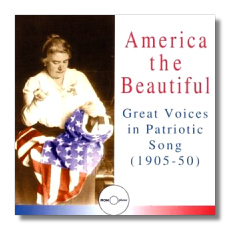
The Internet's Premier Classical Music Source
Related Links
- Latest Reviews
- More Reviews
-
By Composer
-
Collections
DVD & Blu-ray
Books
Concert Reviews
Articles/Interviews
Software
Audio
Search Amazon
Recommended Links
Site News
 CD Review
CD Review
America The Beautiful

Great Voices in Patriotic Song (1905-1950)
Various singers and accompaniments
Romophone 87002-2 ADD monaural 72:01
Some were born in the United States, others were born in Germany or in Italy or in Ireland, but all of the opera singers on this CD believed that the United States was something to sing about. As if to illustrate this, a photo of Austrian-born contralto Ernestine Schumann-Heink is on the booklet cover of this Romophone release; in it, she is sewing a (colorized) American flag. Schumann-Heink contributes two recordings to this collection: When the Boys Come Home (from 1918) and Taps (from 1931, the year in which "Mother" Schumann-Heink turned 70!) In the latter song, it is amazing what the contralto does with just five notes, and how moving those five notes can be!
References in the first paragraph of Romophone's booklet notes to September 11, 2001 and to the destruction of New York City's World Trade Center suggest that this disc is intended as a gesture of sympathy and solidarity with America and the American people – note that Romophone is a British company. (Ivor Novello's Keep the Home Fires Burning is a reminder of this, although here it is sung by Rosa Ponselle.) Some of the songs included in America the Beautiful are innocent and even a little naïve, but perhaps a little of that innocence is just what is needed right now to keep the United States moving forward in faith and in trust. Similarly, some of this singing is a little more operatic than it needs to be, but America's embrace is broad enough to hold the diva, the heldentenor, and more besides.
Twelve of these selections were recorded acoustically. The earliest of these is Emma Eames's 1905 recording of The Star-Spangled Banner, and the most recent are Louise Homer's 1924 recordings of America, the Beautiful and Battle Hymn of the Republic. (Homer, by the way, was composer Samuel Barber's aunt.) Most enjoyable among these are the more popular songs, including Irving Berlin's Over There as sung by Enrico Caruso in outrageously accented English and French, and George M. Cohan's When You Come Back as sung by John McCormack.
The acoustic recordings are associated with World War One. The 11 electrical recordings are associated with World War Two and the years immediately after. Schumann-Heink's Taps is the earliest of the electrical recordings, and the most recent are America, the Beautiful and Battle Hymn of the Republic in recordings from 1950 by Leonard Warren.
Nostalgia and patriotism go together like pie crust and apples. Romophone has baked the two of them into an unusual and collectible apple pie. The transfers are by the ever-dependable Mark Obert-Thorn.
Copyright © 2002, Raymond Tuttle
















